March Theater Guide: New Talent on the March
- Like
- Digg
- Del
- Tumblr
- VKontakte
- Buffer
- Love This
- Odnoklassniki
- Meneame
- Blogger
- Amazon
- Yahoo Mail
- Gmail
- AOL
- Newsvine
- HackerNews
- Evernote
- MySpace
- Mail.ru
- Viadeo
- Line
- Comments
- Yummly
- SMS
- Viber
- Telegram
- Subscribe
- Skype
- Facebook Messenger
- Kakao
- LiveJournal
- Yammer
- Edgar
- Fintel
- Mix
- Instapaper
- Copy Link

‘In the Time of the Butterflies’ is a recent stage adaptation, by Caridad Svich, of the true-life novel about women who opposed a dictatorial regime in the Dominican Republic. It’s at Prime Stage Theatre, and playing the trio who called themselves ‘the butterflies’ are (L to R) Evelyn Hernandez, Frances Tirado, and Krystal Rivera. (photo: Laura Slovesko)
Have we entered a new golden age of live theater? Maybe so. A generation of really good new playwrights are currently at work across the English-speaking world, and Pittsburgh companies this month are performing plays by several.
Pittsburgh Public Theater has the latest by Lucas Hnath: A Doll’s House, Part 2, the unauthorized sequel to Henrik Ibsen’s classic, though Ibsen might authorize it if he were still alive. City Theatre presents Jen Silverman’s The Roommate, a two-woman bang-up described as The Odd Couple meets “Breaking Bad.”
Sarah Kosar’s Mumburger—a grisly comical sandwich about life, death, and digestion—gets its U.S. premiere at off the WALL productions. Kosar, a local native from Butler, has been making her mark as an expatriate theater artist in London, where Mumburger debuted. And barebones productions has extended its run of Matthew Lopez’s The Legend of Georgia McBride, a flamboyant comedy about impersonation.
The March schedule also includes late-20th-century shows by masters who emerged in that era. Point Park U. follows up Caryl Churchill’s Vinegar Tom by staging Sunday in the Park with George, the Stephen Sondheim-James Lapine musical. McKeesport Little Theater, the company with an enigmatically cool slogan (“Because Anyone Can Watch a Movie!”), has Christopher Durang’s Baby with the Bathwater.
Meanwhile, Pittsburgh Opera plays both ends of the new/old spectrum, entering March with Tom Cipullo’s Glory Denied, then producing Puccini’s La Bohème to segue into April.
There’s more—including the premiere of Savior Samuel by Mark Clayton Southers at Pittsburgh Playwrights—plus two big touring productions with short titles, Camille A. Brown’s modern-dance piece ink and the weird multimedia piece Leo. Shows are previewed in order of their run dates, in three categories: Continuing from February, Shows in the March Spotlight, and Other Suggested Productions.
Continuing from February:
CABARET (musical) by John Kander, Fred Ebb, and Joe Masteroff. Through March 2, Carnegie Mellon School of Drama.
Cabaret is not a rock musical, but it officially rocks. A Rolling Stone readers’ poll in 2016 ranked it one of the 10 best musicals ever. Set in Germany amid the Nazi takeover between the World Wars, Cabaret is a story of people trying to party or at least lead normal lives while their society goes nuts. It has everything from great songs to ironic humor to gripping drama, and every production seems to bring out new dimensions of this 1967 Tony Award winner. The 1972 movie featured an ultra-chilling rendition of “Tomorrow Belongs to Me.” Multiple stage revivals starred Alan Cumming as the ultra-kinky Emcee of the Kit Kat Klub. And now Carnegie Mellon School of Drama performs Cabaret, to celebrate today’s society going nuts in its own unique ways. Music by John Kander, lyrics by Fred Ebb, book by Joe Masteroff. In the Philip Chosky Theater on Carnegie Mellon’s campus. Sold out, so check your alternate sources. 4000 Forbes Ave., Oakland.
THE PHANTOM OF THE OPERA (musical) by Andrew Lloyd Webber, Charles Hart, and Richard Stilgoe. Through March 3, touring company at Benedum Center.
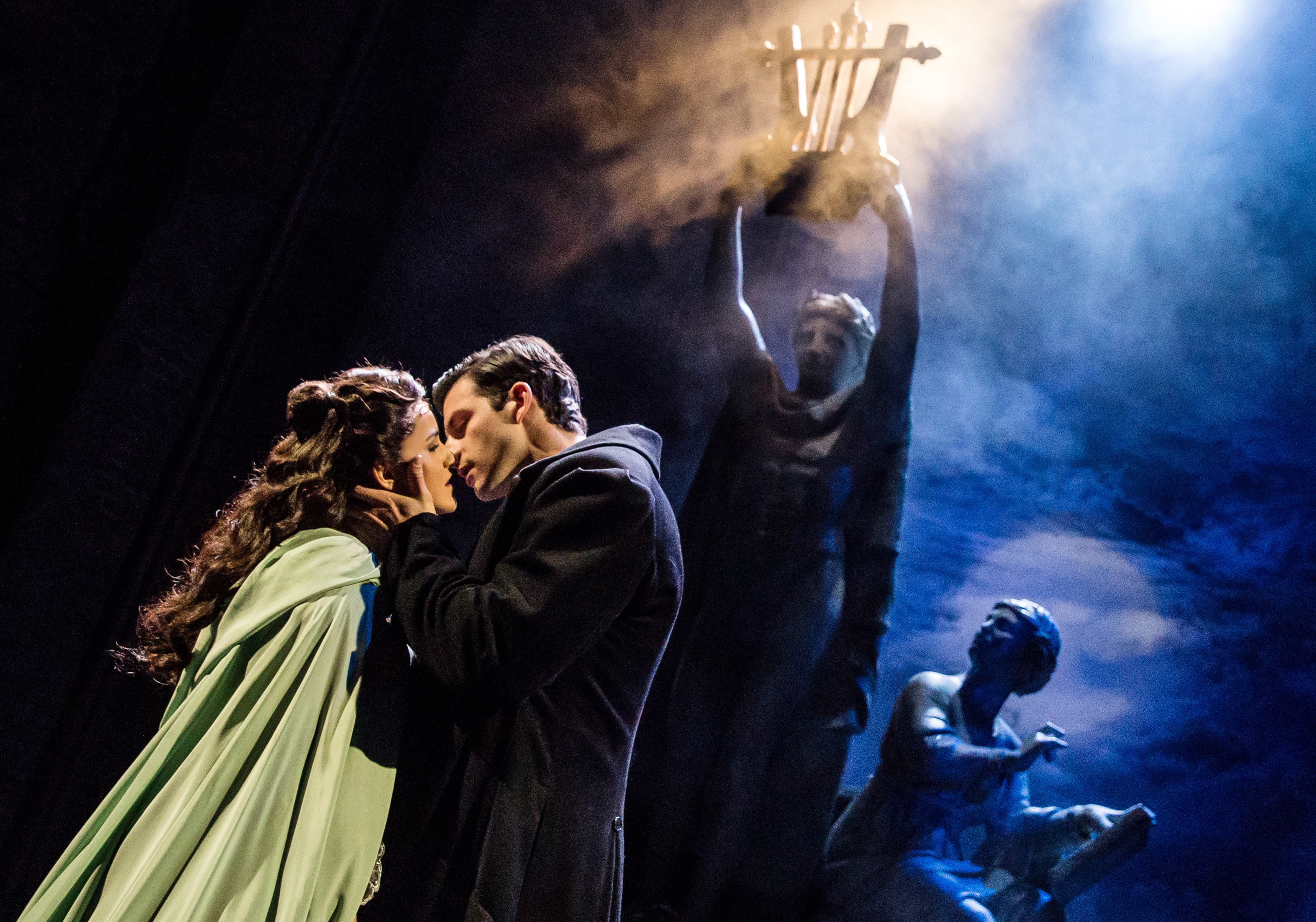
You want spooky effects, you got ’em, in the new ‘Phantom of the Opera’ that’s visiting Pittsburgh. (photo: Matthew Murphy)
Last winter, Pittsburgh hosted a touring production of Love Never Dies, the long-awaited and not exactly universally praised sequel to a certain phantom’s adventures. This year we are visited by The Phantom of the Opera itself. Andrew Lloyd Webber’s 1986 mega-hit is still playing in New York and London, having set the Broadway record for longest continuous run by a musical while closing in on the London/West End record held by Les Miz. That’s plenty of credentials for the show about the spooky opera-house legend—but a new tour has to promise something new, so here are quotes from the promo material: This production has “brilliant new scenic design” and “many exciting special effects,” making The Phantom of the Opera “bigger and better than ever before.” Lauded young baritone Quentin Oliver Lee plays the title role. Canadian soprano and dance artist Eva Tavares is Christine. Part of the PNC Broadway in Pittsburgh series at Benedum Center, 237 7th St., Cultural District.
GLORY DENIED (opera) by Tom Cipullo, from Tom Philpott’s book. Through March 3, Pittsburgh Opera.

They’re both Col. Jim Thompson, but in ‘Glory Denied’ at Pittsburgh Opera, the specter of the younger Thompson—a POW for nine years—haunts the decorated postwar vet. Singers are tenor Terrence Chin-Loy (L) and baritone Benjamin Taylor. (photo: David Bachman Photography)
Pittsburgh Opera presents a modern chamber opera based on a wrenching true story. Tom Cipullo’s Glory Denied dramatizes the wartime and homecoming ordeals of U.S. Army Colonel Jim Thompson, America’s longest-held prisoner of war. Thompson, a career officer, went to Vietnam just as U.S. involvement there was escalating. Captured in 1964, he survived nine grueling years in prison camps. Released in 1973, he returned home to find his wife and children living with another man—they had thought Thompson was dead—and an American society so changed that it felt foreign to him. Glory Denied is drawn from a nonfiction book of the same title by Tom Philpott. The opera uses an unusual device: Two singers play “young” Col. Thompson and his wife Alyce, as they lived until and during the soldier’s POW years, and two others play the older postwar couple, with all four interacting. Pittsburgh Opera has tenor Terrence Chin-Loy and soprano Ashley Fabian as the younger couple, joined by baritone Benjamin Taylor and soprano Caitlin Gotimer. At Pittsburgh Opera Headquarters, 2425 Liberty Ave., Strip District.
THE LEGEND OF GEORGIA MCBRIDE by Matthew Lopez. Through March 17, barebones productions.

Elvis is bummed when his boss embraces a new star in ‘The Legend of Georgia McBride.’ Actors for barebones productions are (L to R) Andrew Swackhamer, David Conrad, and Shua Potter. (photo from barebones)
Playwright Matthew Lopez is known for sensitive, nuanced treatments of LGBTQ and racial/ethnic themes. There are times, however, when one must say “Screw the nuance, let’s go for laughs,” and therefore Lopez wrote The Legend of Georgia McBride. It’s set in a seedy bar in the Florida panhandle. The bar’s Elvis impersonator is failing to draw crowds, so the owner replaces him with a couple of drag queens. When one of them can’t make a gig, the former fake Elvis is pressed into action, and presto—a legend is born. The Legend of Georgia McBride made its New York debut in 2015. A critic for the Times found it more fun than “RuPaul’s Drag Race,” which is high praise, if one can believe an allegedly failing newspaper. Pittsburgh theater fans can see the theory tested. Barebones productions presents The Legend of Georgia McBride with actors Andrew Swackhamer, David Conrad, Shua Potter, Justin Lonesome, and Sara Williams. In the barebones black box at 1211 Braddock Ave., Braddock.
VINEGAR TOM by Caryl Churchill. Through March 10, Point Park Conservatory Theatre.
When Caryl Churchill turned 80 last year, articles in the British press paid tribute to her status as the grand dame of feminist theater and one of the most unconventional, “unpredictable” modern playwrights. Her plays vary in subject and style, many of them shape-shifting as they unfold. Here in Pittsburgh, Point Park Conservatory Theatre pays tribute by staging Churchill’s Vinegar Tom. The subject is persecution of alleged witches in England during the 1600s. In that respect the play is similar to Arthur Miller’s The Crucible—if you can imagine a Crucible with sex scenes, execution scenes, and raunchy songs. Various women are accused of causing everything that goes wrong in a small village. The common thread is that all the suspected culprits are women, since women are seen as inherently wicked. And Vinegar Tom? He’s a black cat who just might be, or symbolize, the real villain. In the Rauh Theatre at the new Pittsburgh Playhouse. Sold out, so dig for tix. 350 Forbes Ave., Downtown.
SAVIOR SAMUEL by Mark Clayton Southers. Through March 16, Pittsburgh Playwrights Theatre Co.
Pittsburgh Playwrights Theatre Company premieres a play by Mark Clayton Southers, the company’s founder and artistic director. Savior Samuel is a tale with spiritual and supernatural overtones, revolving around a family of African-American homesteaders in the Midwest during the 1870s. The title character is an unwanted child who turns out to have a mystical saving grace This is the second recent play by Southers that deals with African Americans in the 19th century. His previous, Miss Julie, Clarissa and John, was a sly re-working of August Strindberg’s Miss Julie. Critics and audiences loved that one, and early responses to Savior Samuel are equally enthusiastic.The cast includes Wali Jamal, Cheryl El-Walker, Jonathan Berry, and teenager Aaliyah Sanders in a pivotal role. In the Trust Arts Education Center, 805 Liberty Ave., Cultural District.
Shows in the Entertainment Central spotlight for March:
MUMBURGER by Sarah Kosar. March 1-16, off the WALL productions.
Sarah Kosar’s Mumburger, a surreal dark comedy from London, is being given its U.S. premiere by off the WALL productions. The play has drawn notice overseas for the unusual story it tells. A woman dies in a highway accident. Her grown daughter, stunned, must deal with her grieving dad while trying to order a coffin and such, until both learn that Mum had made a different arrangement for the disposition of her remains—a disposition that will clash with the daughter’s vegan regimen, and that’s why the play is called Mumburger. Surely, symbolism abounds in this remarkable device for getting to the meat of so many things. More remarkably, playwright Kosar hails from Butler, Pennsylvania. A graduate of Butler High and Penn State, she studied abroad in London, then returned there to live and work in 2010. She is now pegged as a theater artist to watch in the British scene. Off the WALL’s Mumburger has Jessie Wray Goodman playing the daughter and Ken Bolden as the dad. At Carnegie Stage, 25 W. Main St., Carnegie.
THE ROOMMATE by Jen Silverman. March 2-24, City Theatre.

Laurie Klatscher (L) is smokin’ in ‘The Roommate’ at City Theatre, while Tamara Tunie observes. (photo: Kristi Jan Hoover)
Jen Silverman’s play The Roommate has been described as The Odd Couple meets “Breaking Bad.” An Iowa woman in her 50s, divorced after a less-than-fulfilling career as a housewife and mom, advertises for a female tenant of similar age to share her empty nest. The tenant she gets is a brassy babe from The Bronx. This woman arrives with a different brand of emotional baggage, not to mention expertise in cultivating a crop more potent than Iowa corn. The Roommate is a seriocomedy with a surprise ending. Last year it ran at Chicago’s Steppenwolf Theatre, and now City Theatre—devoted to producing new and recent plays that haven’t been seen in Pittsburgh—presents The Roommate here. Playing the two women are Laurie Klatscher and Tamara Tunie, fresh from their roles as Gonzalo and Prospero in The Tempest at The Public. Those Shakespeare characters were dear friends, but never roommates. 1300 Bingham St., South Side.
A DOLL’S HOUSE, PART 2 by Lucas Hnath. March 7 – April 7, Pittsburgh Public Theater.

Cue the sequel: she’s back. Lisa Velten Smith is Nora in ‘A Doll’s House, Part 2’ by Lucas Hnath, at The Public. (photo courtesy of the artist)
Among the current wave of hot new playwrights, the A-list includes Lucas Hnath, whose subject matter ranges widely. His Isaac’s Eye is a riff on Isaac Newton and science, while Red Speedo revolves around a competitive swimmer caught doping. The Christians, performed in Pittsburgh two years ago by Kinetic Theatre, is about a church pastor trying to persuade his old-school congregation that Hell does not exist. Now Pittsburgh Public Theater stages Hnath’s A Doll’s House, Part 2, a seriocomic sequel to Henrik Ibsen’s A Doll’s House, which shocked the world in the late 1800s by depicting a liberated woman who leaves her husband and children. Part 2 is set 15 years later. The woman, Nora, returns to confront her estranged husband over their divorce, which still isn’t legally settled, and winds up confronting many other issues as well. Hnath’s plays are praised because his characters are not simple, and neither are the predicaments they face in trying to determine what’s right.
A Doll’s House, Part 2 is directed for The Public by Ted Pappas, the company’s former longtime artistic director. Cast members are Lisa Velten Smith, Daniel Krell, Helena Ruoti, and Marielle Young. At the O’Reilly Theater, 621 Penn Ave., Cultural District.
IN THE TIME OF THE BUTTERFLIES by Caridad Svich, from Julia Alvarez’s novel. March 8 – 17, Prime Stage Theatre.
Rafael Trujillo ruled the Dominican Republic for over 30 years, driving the country to modernize but also driving it into the depths of a brutal dictatorship. He tolerated no rivals or critics, and anyone he deemed troublesome was jailed or killed. In the Time of the Butterflies, performed by Pittsburgh’s Prime Stage Theatre, dramatizes the story of four women who opposed the Trujillo regime. The Mirabal sisters were bright, energetic young women from a middle-class family. They knew Trujillo; one sister even had the unpleasant honor of rejecting the great man’s advances. But what alarmed the Mirabals far more was his state-sponsored reign of terror. Three of the sisters grew active in organizing against him. Eventually, in November of 1960, they were murdered. Outrage over the act helped to provide the final nails for the dictator’s coffin. Six months later, Trujillo himself was assassinated and the regime fell. In the Time of the Butterflies was adapted for the stage by American writer Caridad Svich from Julia Alvarez’s novel. At the New Hazlett Theater, 6 Allegheny Square East, North Side.
INK (modern dance) by Camille A. Brown & Dancers. March 9-10, presented by Pittsburgh Dance Council and the August Wilson Center.
If you caught last year’s stirring NBC-TV production of Jesus Christ Superstar, with John Legend in the title role, you may wish to know that the show’s choreographer is bringing a show of her own to Pittsburgh. She’s Camille A. Brown and her feature-length narrative dance piece is called ink. Like much of her work, it deals with themes related to African-American life. Brown’s latest project on Broadway was the movement design for Tarell McCraney’s Choir Boy, set in a private school for young black men, and you can see her mark in the results. But ink goes deeper. Created for her own company, Camille A. Brown & Dancers, it explores how African identity has evolved and is expressed in America. The show has seven segments, with subjects ranging from an ancient Yoruba ritual to modern black city culture; the dance and music vary accordingly. Brown writes that the segments “represent super powers of spirituality, history and heritage, the celebration of the Black female body, Black love, brotherhood, exhaustion, and community.” Pittsburgh Dance Council and the August Wilson Center present ink at 980 Liberty Ave., Cultural District.
BNY MELLON PRESENTS PITTSBURGH BALLET THEATRE + DANCE THEATRE OF HARLEM. March 15-24 at the August Wilson Center.

A perfect match: Alison Stroming (L) of Dance Theatre of Harlem and Pittsburgh Ballet Theatre’s Diana Yohe are synched up—as are the two companies, for joint performances at the August Wilson Center. (photo: Duane Rieder)
Two years ago, Pittsburgh Ballet Theatre partnered with Dance Theatre of Harlem for a combined show. It went so well that the companies are doing another one, courtesy of nameplate sponsor BNY Mellon. Both are classical ballet companies that perform adventurous modern pieces along with traditional ballets. The pieces for this year’s collaboration include Stanton Welch’s Orange, set to music by Vivaldi and danced by members of the two troupes together, plus selections from the repertories of each. Seven performances in all are scheduled, with a “Program A” and “Program B” alternating. Orange and George Balanchine’s energetic Rubies (performed by Pittsburgh Ballet dancers) are on both the A and B slates. At the August Wilson Center, 980 Liberty Ave., Cultural District.
SUNDAY IN THE PARK WITH GEORGE (musical) by Stephen Sondheim and James Lapine. March 15-24, Point Park Conservatory Theatre.
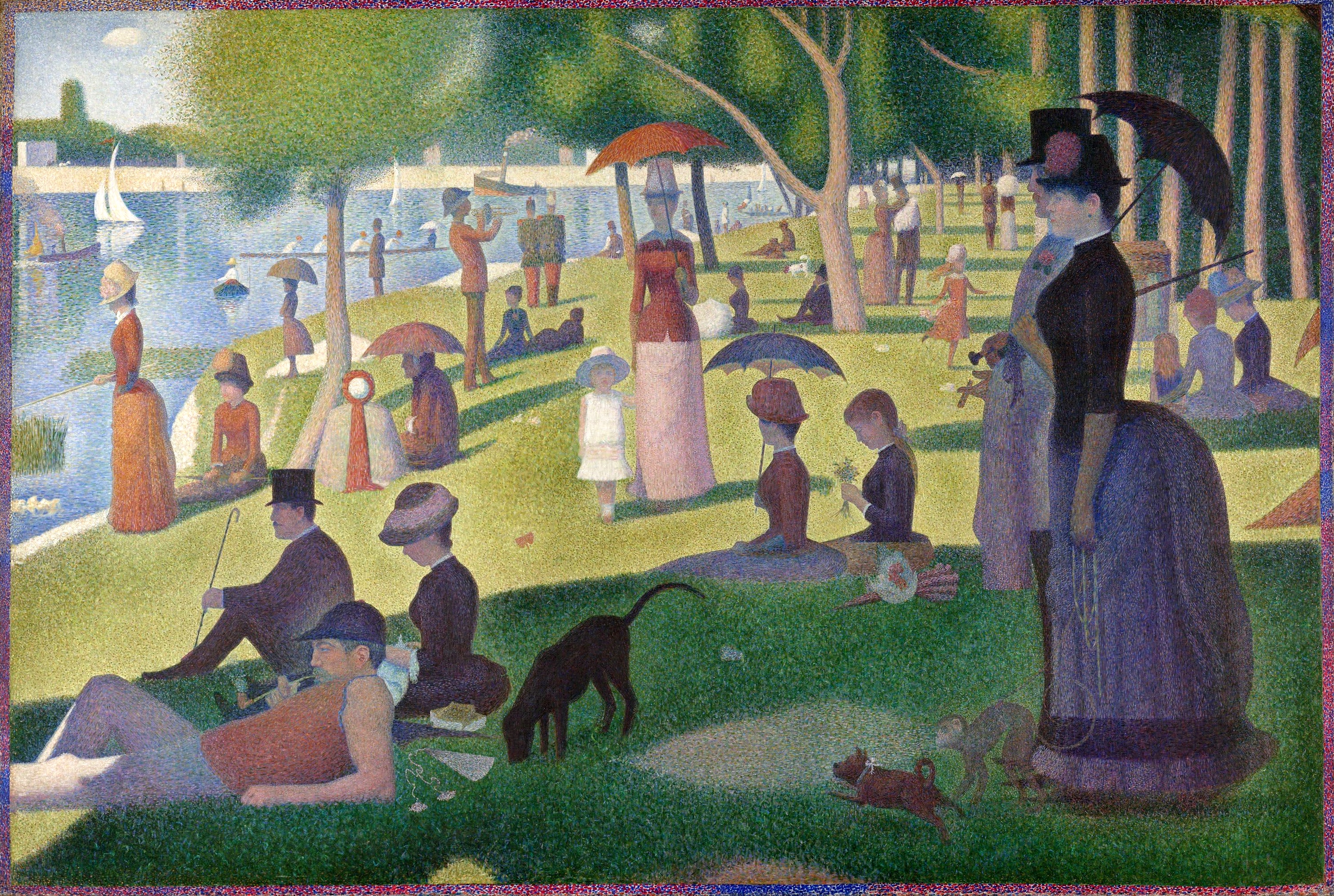
Do you see a Broadway musical in this picture? Georges Seurat’s 1884 painting ‘A Sunday on La Grande Jatte’ was the inspiration for Stephen Sondheim and James Lapine’s ‘Sunday in the Park with George,’ on stage at Pittsburgh Playhouse. (image: Art Institute of Chicago)
Point Park University’s student company, the Conservatory Theatre, continues its first season in the new Pittsburgh Playhouse with a classic musical. Stephen Sondheim and James Lapine’s Sunday in the Park with George is also a very strange musical. It received the Pulitzer Prize for Drama but no major Tony Awards, a rare distinction. It’s a serious musical, about art and the challenges of being an artist. Inspired by the life of painter Georges Seurat, it takes great artistic liberties with the true story of his life. (Seurat’s longtime lover did not leave him. He had no grandchildren, etc.) And if there were an award for Most Outrageous Pun in a Musical, Sunday in the Park with George would win. Georges Seurat was credited with inventing pointillism, the method of constructing a painting from tiny points of color. His real-life lover’s name was Madeleine. Her name in the musical is Dot. Sunday in the Park with George opened on Broadway in 1984 and won the ‘85 Pulitzer. The prize committee thought it was darn good, as do many theater fans. Pittsburgh Playhouse, 350 Forbes Ave., Downtown.
NUNSENSE: THE MEGA MUSICAL by Dan Goggin. March 21-31, Pittsburgh Musical Theater.
Those who are tempted to see Nunsense: The Mega Musical, at Pittsburgh Musical Theater, may be forgiven for the sin of not knowing exactly what the show consists of. There’s been tons of nun humor on stage and screen, so here is a primer for the uninitiated. Writer/composer Dan Goggin is perhaps the most successful practitioner of the genre. His Nunsense franchise includes the original off-Broadway hit, plus sequels and spinoffs such as Nunsense: The Second Coming, Nunset Boulevard, and Nunsense: A-Men, a Brazilian adaptation with an all-male cast. Official Nunsense merch includes a water bottle for exercise or biking, and if you wonder “Why a water bottle?” you weren’t raised Catholic. As for Nunsense: The Mega Musical, it is Goggin’s expanded version of the 1985 original, with additional musical numbers and characters. You meet Sister Julia, Child of God, the chef at the convent of the Little Sisters of Hoboken, who was not seen onstage in the original, but who triggers the whole phenomenon by serving the tainted vichyssoise that kills 52 Sisters, thereby incurring burial costs that prompt the surviving nuns to raise money by putting on a show. At the Gargaro Theater, 327 S. Main St., West End.
WITH A SHADOW OF … (modern dance with multimedia) by Beth Corning. March 27-31, CorningWorks.
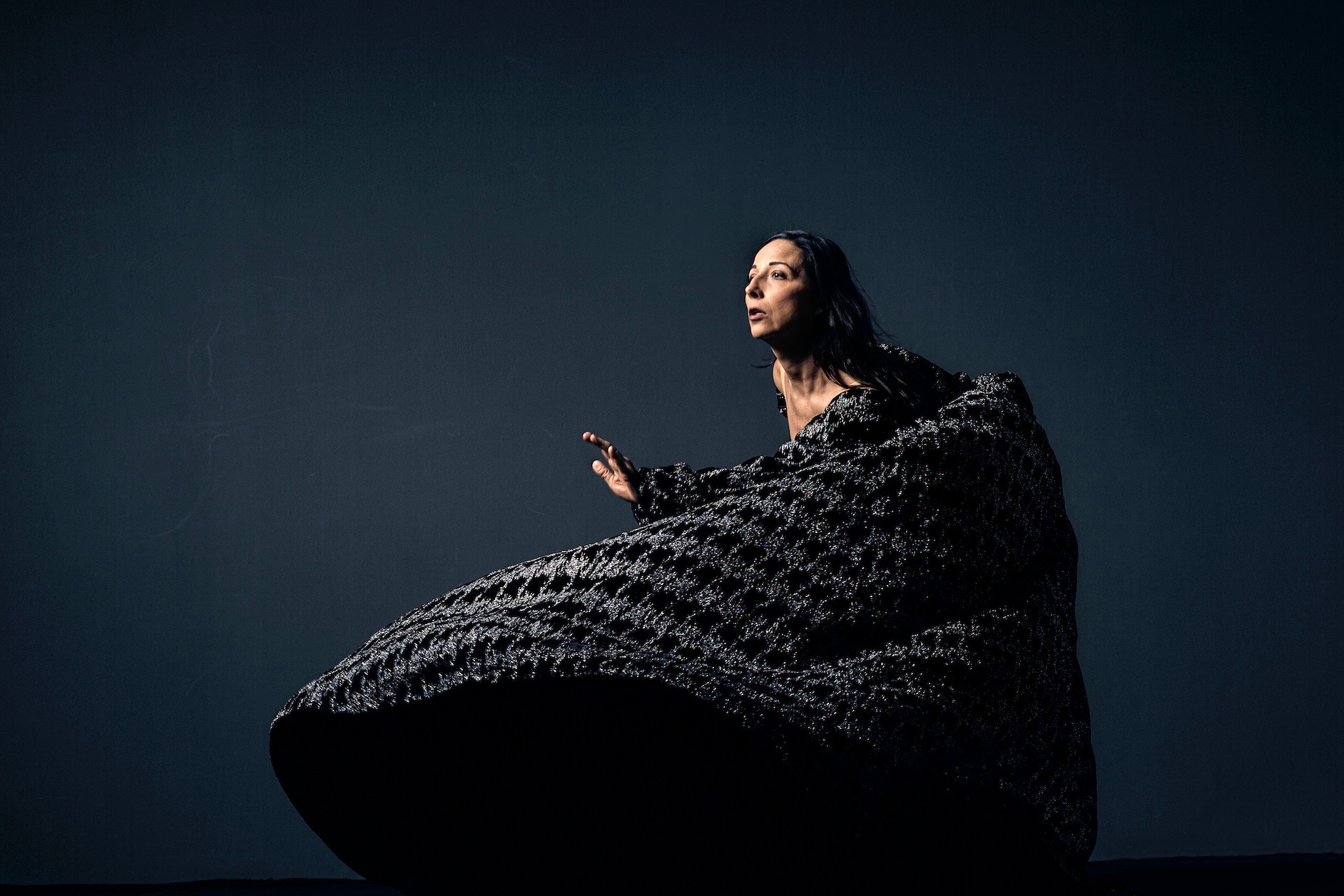
Dancer Catherine Meredith enters the twilight zone between waking and sleep in Beth Corning’s ‘with a shadow of …’ (photo: Frank Walsh)
The trance-like state between waking and sleep, when you’ve just begun to drift off, has a scientific name: hypnagogia. It has long fascinated artists, because the merging of dreams with conscious thought can lead to visions and insights unlike either. Salvador Dali claimed that hypnagogia helped him get surreal. And there’s an old creative-writing exercise that involves lying on the floor with one arm in the air. The idea is that as you slip into hypnagogia, the arm will drop and snap you awake, so you can write down what you saw. Pittsburgh dance artist Beth Corning presents another idea. She has created a feature-length dance and multimedia piece about this magical transitional state. Titled with a shadow of …, it follows her previous piece, 2018’s The Waiting Room, which dealt with the transition from life to death. Do we detect a pattern or are we dreaming? The new with a shadow of … is performed by Janis Brenner, David Dorfman, and Catherine Meredith along with Corning. At the New Hazlett Theater, 6 Allegheny Square East, North Side.
MIDNIGHT RADIO’S THE WONDERFUL WIZARD OF OZ, adapted by Lissa Brennan. March 28 – April 14, Bricolage Production Company.
Newcomers to Pittsburgh are surprised to learn that Midnight Radio is not at midnight nor on the radio. It’s live theater done in the style of an old-time radio drama, but often more comedy than drama, and since some of the city’s best theater artists are involved, the laughter quotient can be quite high. Having celebrated this past Christmas with a unique adaptation of Die Hard, the Midnight Radio team now turns to another classic from the Western canon: L. Frank Baum’s The Wonderful Wizard of Oz. Lissa Brennan has done the adapting for this one. Cast members—all in multiple roles—are Julianne Avolio (her parts include Dorothy), Lisa Ann Goldsmith (all witches, dead and alive), Sam Lothard, Jason McCune, and Nancy McNulty. The show also includes added features for audience accessibility and sensory-friendliness, with an ASL-interpreted performance scheduled for April 5. The Wonderful Wizard of Oz is presented by Bricolage Production Company and it opens the company’s 11th season of Midnight Radio. 937 Liberty Ave., Cultural District.
LEO (theater/video effects) presented by Y2D Productions, with Chamäleon Productions. March 29-30, touring show at the Byham Theater.
Leo, the bizarre theater piece visiting Pittsburgh, demonstrates what can happen when a skilled pantomime comic adds technology to his act. The show grew from an idea hatched by a German performer, Tobias Wegner. A fan of the physical comedy in old silent films, Wegner had learned that art well. He also knew that a camera frame turned sideways will flip things, so that, for instance, a person crawling across a floor appears to be climbing a flat wall in defiance of gravity. Wegner’s idea was to give the audience both views at once. In a piece called Wall Clown, he’d perform a comic routine live, while a flipped-perspective video stream of his movements played on a large screen next to him. Leo elaborates on this device. Developed by Chamäleon Productions of Berlin and Y2D Productions of Montreal, it adds more twists, creating hallucinatory (and often hilarious) effects. The show has won awards at festivals including the Edinburgh Fringe. See Leo here at the Byham Theater, 101 6th St., Cultural District.
LA BOHÈME (opera) by Giacomo Puccini. March 30 – April 7, Pittsburgh Opera.
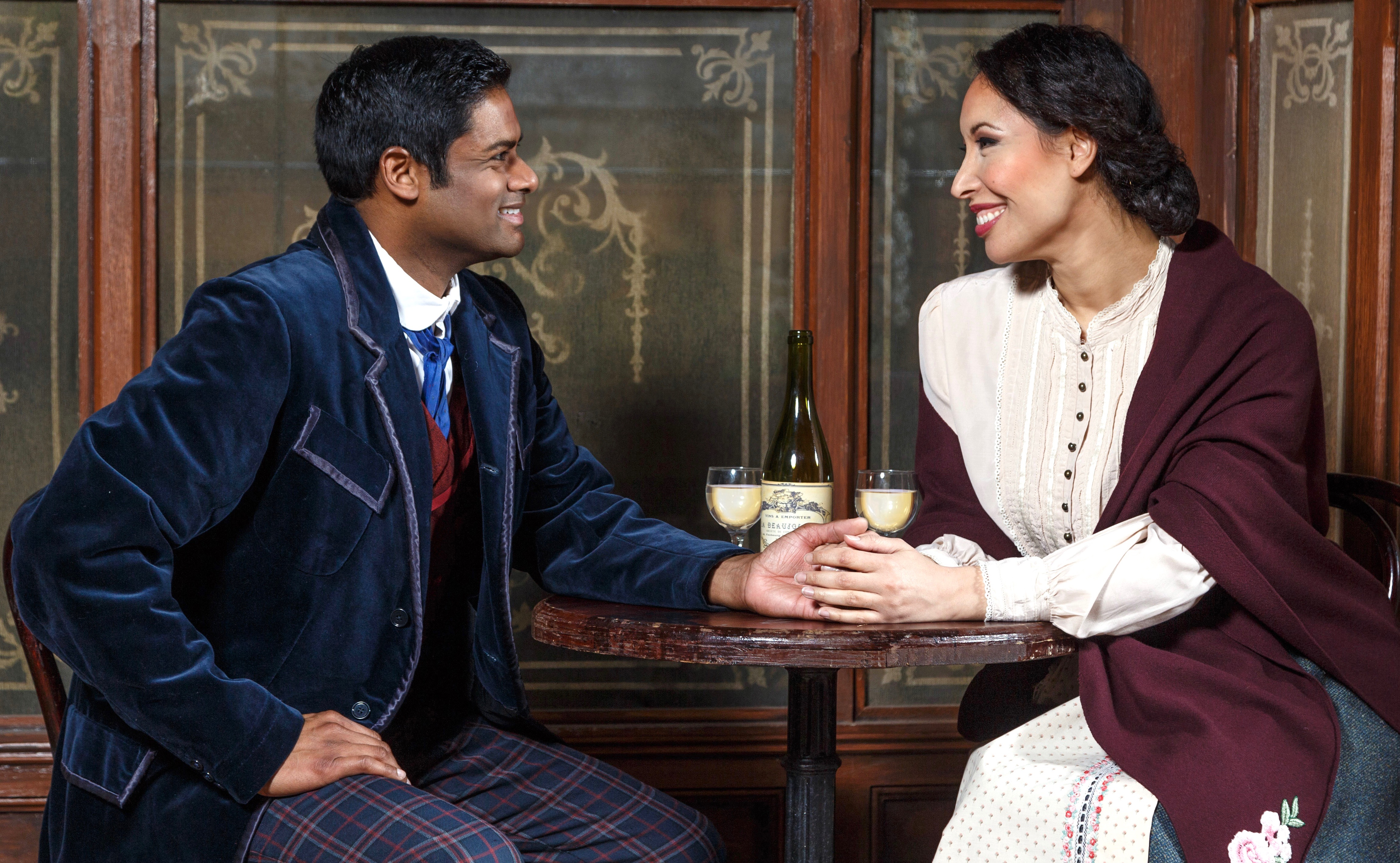
Rodolfo (tenor Sean Panikkar) and Mimi (soprano Nicole Cabell) are all decked out for a happy first date in Puccini’s ‘La Bohème’ at Pittsburgh Opera. (photo: David Bachman Photography)
A little extra publicity never hurts. Giacomo Puccini’s La Bohème, a longtime audience favorite, gets an added boost in modern times by being known as the opera that inspired the musical Rent. See (and hear) what made the original popular, as Pittsburgh Opera stages La Bohème. The opera is loved for its music, of course—the romantic duet O soave fanciulla (“O sweet girl”) comes across wonderfully even without English translation—and the story is richly engaging. It’s set during the 1830s in Paris, where the term “bohemian” was first applied to artistic types living at the fringes of society. Puccini knew the lifestyle from his younger days, and for La Bohème he worked with a pair of skilled librettists, Luigi Illica and Giuseppe Giacosa. Together they crafted an opera that’s like an emotional roller coaster, following a group of young bohemians through hilarious escapades mixed with the tensions and perils of living at the edge. Singing the lead roles for Pittsburgh Opera are tenor Sean Panikkar as Rodolfo and Nicole Cabell, a heralded soprano making her first appearance here, as Mimi. In Italian with English supertitles. Benedum Center, 237 7th St., Cultural District.
A Long-Running Show:
THE DOUBLE-THREAT TRIO (cabaret musical) by Adam Overett. Through April 28, Pittsburgh CLO Cabaret.

J. Alex Noble, Jerreme Rodriguez, and Drew Leigh Williams portray the performance-impaired ‘Double-Threat Trio’ for Pittsburgh CLO Cabaret. (photo: Archie Carpenter)
In the old days of football, before players specialized, a “triple-threat” man was somebody who could run, pass, and kick with the best. The term got borrowed for musical theater, where a top performer must be good at singing, dancing, and acting. A few years ago, off-Broadway composer Adam Overett wrote a comical song about a singer who can’t act. When done with appropriate ineptitude, it’s hilarious—and Overett has now spun the idea into a feature-length musical comedy. Pittsburgh CLO presents the world premiere of The Double-Threat Trio. The story concerns three friends eager to make it in show biz. Their problem is that each is sorely deficient in one of the three skills required. Playing The Double-Threat Trio for CLO are J. Alex Noble, Jerreme Rodriguez, and Drew Leigh Williams. (And BTW, they’re all triple-talented, as they must be. You’ve got to be good to do a good job of pretending to do something badly.) At the Greer Cabaret Theater, 655 Penn Ave., Cultural District.
Other Suggested Productions:
CIRQUE MECHANICS: 42 FT—A MENAGERIE OF MECHANICAL MARVELS (circus/acrobatics). March 3 only, 2 p.m., touring company at the Byham Theater.
You’ve heard of physical comedy and physical theater; now meet physical circus. The U.S. company Cirque Mechanics creates shows that don’t rely much on multimedia or special effects. Rather, they combine the performers’ “raw” physical virtuosity with acts that involve using a wide array of mechanical gear—such as specially designed aerial rigs, and all sorts of wheeled devices and hoops. Cirque Mechanics visits Pittsburgh with a show titled 42 ft—A Menagerie of Mechanical Marvels. The “42 ft” refers to the diameter of the ring in a traditional one-ring circus. A matinee performance only, 2 p.m. at the Byham Theater, 101 6th St., Cultural District.
SHEN YUN PERFORMING ARTS (Chinese dance/theater). March 5-7, annual touring show at Benedum Center.
In what has become an annual custom, the Shen Yun Performing Arts troupe visits Pittsburgh with a new feature-length show. Shen Yun’s productions may seem, at first, like a cross between Bollywood spectacle and some odd hybrid of Western dance, but they are distinctly Chinese. The performers’ mesmerizing movements and astounding leaps are from classical Chinese dance, which evolved over the millennia to incorporate elements of martial arts, acrobatics, storytelling pantomime, and spiritual expression. These elements are combined with modern stagecraft to dramatize folk tales and true stories from China’s long history. Benedum Center, 237 7thSt., Cultural District.
WORDPLAY (storytelling/participation event). March 8-9, Bricolage Production Company.
What goes around comes around. Storytelling is probably the oldest narrative art (although it’s possible that early humans may have danced or pantomimed stories, before they learned how to talk them)—and Pittsburgh’s Bricolage Production Company is totally on the case in terms of the modern-day storytelling revival. Bricolage’s participatory theater event WordPlay is billed as “a new spin on storytelling.” You are invited to show up and tell your story—as long as it’s true, because this is nonfiction, and nonfiction means “not not true.” Bricolage will then literally put the “spin” on each story by having a DJ on hand, to accompany the tales by spinning music and sounds that are utterly unpredictable. 937 Liberty Ave., Cultural District.
STAGE RIGHT’S GUINNESS WORLD RECORD ATTEMPT (musical in a day). March 9 only, 8 p.m., Stage Right of Greensburg.
In 2016, students and faculty at the Sharpe Academy of Theatre Arts in England set a Guinness World Record for Fastest Theatrical Production. Given a sealed packet revealing the show they were to do—the musical Annie—they learned, rehearsed, and staged it for a paying audience, complete with sets and costumes, 15 hours later. Stage Right of Greensburg is out to break the record. Members of the group’s professional company and school aim to prepare a musical in 14 hours and 30 minutes. You can see the result at 8 p.m. on March 9 at The Palace Theatre, 21 W. Otterman St., Greensburg.
MYTHBURGH SEASON 3 (storytelling/performance). March 10 only, 8 p.m. 12 Peers Theater.
The Mythburgh series is a periodic getting-together of local theater artists who turn strange Pittsburgh stories into short performance pieces. The stories can be serious, illogical, true, apocryphal, or otherwise; the unifying theme is that they have a mythical, urban-legend quality. Presented by 12 Peers Theater, Mythburgh events occur twice around springtime and twice in the fall. Mythburgh Season 3 kicks off March 10 at 8 p.m. at Brillobox, 4104 Penn Ave., Bloomfield.
PROOF by David Auburn. March 14-30, Pittsburgh Classic Players.
Pittsburgh Classic Players, a new theater company devoted to both modern and older classics, continues its season with a drama that won the 2001 Pulitzer Prize and the Tony Award for Best Play. David Auburn’s Proof is about madness, mathematics, and love. The story—an eerie and complex one—centers on the daughter of a famous mathematician who has become delusional. Is the young woman a genius in her own right or is she going mad like dad? Proof is directed by Jonathan Visser and acted by Chris Cattell, David Maslow, Alison Weisgall, and PCP Artistic Director Harper York. At the Spartan Community Center, 134 E. Elizabeth St., Hazelwood.
BABY WITH THE BATHWATER by Christopher Durang. March 15-24, McKeesport Little Theater.
Playwright Christopher Durang broke upon the cultural scene around the same time as a certain British New Wave band, which is why your mind’s voice wants to say “Durang Durang.” But rather than howling “Hungry Like the Wolf,” Durang writes satirical comedies that make audiences howl. Baby with the Bathwater is a 1983 play about a boy named Daisy, who manfully (womanfully?) overcomes obstacles galore while growing up to assert his (her?) true gender identity. McKeesport Little Theater performs it at 1614 Coursin St., McKeesport.
RHYTHM OF THE DANCE by National Dance Company of Ireland. March 17 only, 6 p.m., touring production at The Palace Theatre.
How true to its roots is the supposedly authentic Irish music and dance that we get? Maybe it’s best not to care, for as Louis Armstrong once observed, all music is “folk music”—horses don’t create it. The touring show Rhythm of the Dance, which has been circling the globe for the past 20 years and evolving as it goes, is a case in point. Produced by an outfit called National Dance Company of Ireland, the show features top-notch traditional Irish step dancers, and musicians with traditional instruments playing for the dances and songs. But there are many touches of modern showmanship as well, and it all seems to work out. Judge for yourself when Rhythm of the Dance visits The Palace Theatre for one night only. 6 p.m. 21 W. Otterman St., Greensburg.
PILGRIMS by Claire Kiechel. March 20-22, Carnegie Mellon School of Drama.
Claire Kiechel’s play Pilgrims is a socio-drama with a sci-fi setting. The pilgrims are a disillusioned soldier and a troubled teenager aboard a passenger spaceship. They’re bound for a newly colonized planet that is expected to be more livable than even the most livable city on Earth has become. Then a robot flight attendant says they must stay confined to their quarters because a virus has broken out on the ship. And not the kind William S. Burroughs meant when he wrote that “Language is a virus from outer space.” Carnegie Mellon School of Drama performs Pilgrims in a FREE production, i.e., with no admission charge. In the Helen Wayne Rauh Studio Theater on campus, 5000 Forbes Ave., Oakland.
THE LARAMIE PROJECT by Moisés Kaufman and the Tectonic Theater Project. March 22-24, Actors and Artists of Fayette County.
The Laramie Project, a true-to-life play, is a gripping example of the form called documentary theater. Its subject is the brutal 1998 murder of Matthew Shepard, a young gay man who was a student at the University of Wyoming. Shepard’s death drew national attention to hate crimes while becoming a subject of protests and controversy. New York-based theater artist Moisés Kaufman and colleagues in his Tectonic Theater Project created the play by interviewing people throughout the Laramie area, then adding material from news stories and their own observations. Actors and Artists of Fayette County perform The Laramie Project at the Geyer Performing Arts Center, 111 Pittsburgh St., Scottdale.
UNCHARTED (ballet/dance) by various artists. March 22-24, Texture Contemporary Ballet.
The company whose name says it all—Texture Contemporary Ballet—presents a show of new dances by four choreographers. Alan Obuzor, Texture’s artistic director, has created a meta-piece about the process of creating a ballet. Other choreographers are Kelsey Bartman, Alexandra Tiso, and guest artist Christopher Bandy. Expect a variety of music, including Coldplay. The four-piece program goes by the title Uncharted and it’s at the New Hazlett Theater, 6 Allegheny Square East, North Side.
EQUINOX (modern dance) by various artists. March 23-24, Exhalations Dance Theatre.
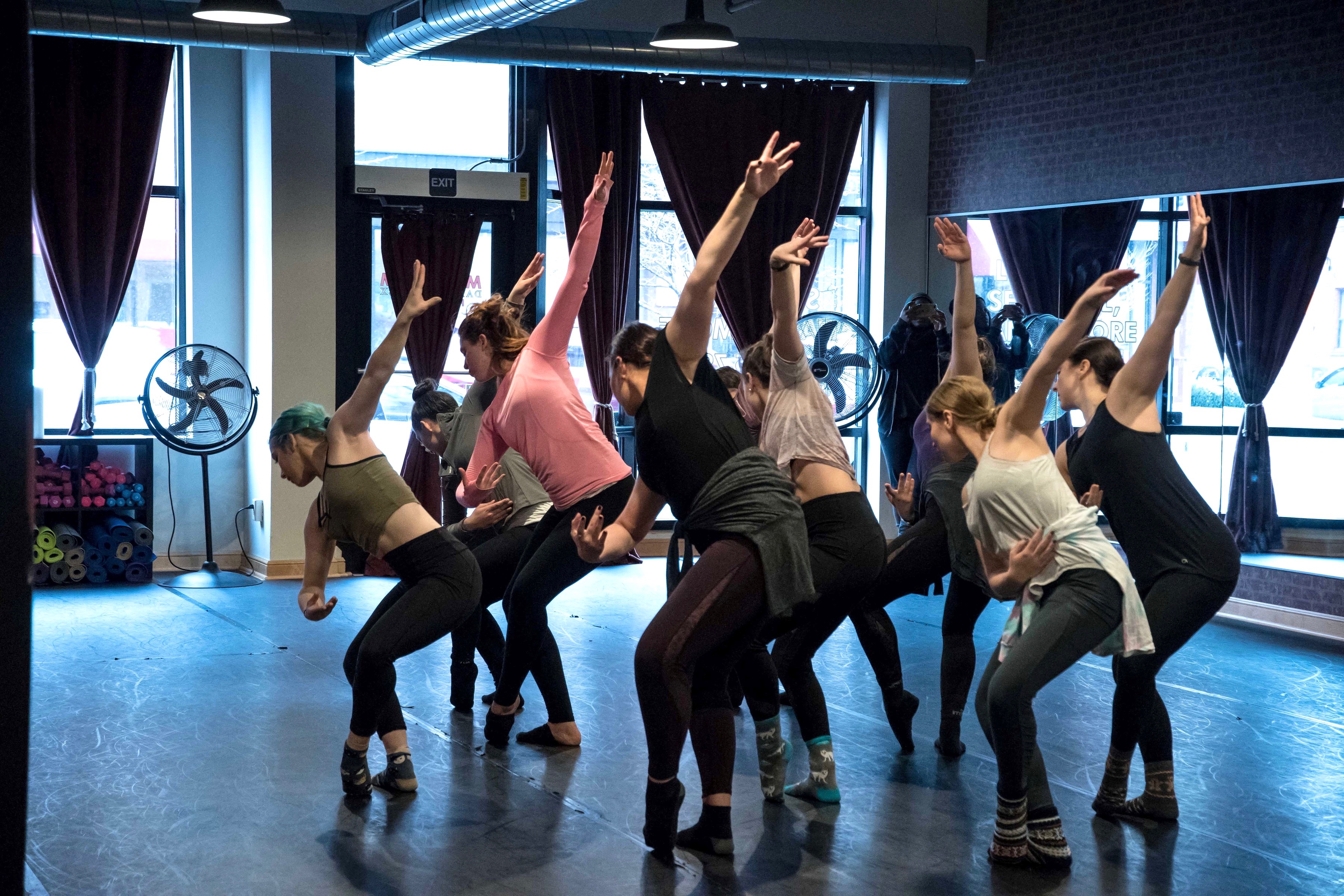
Spring is coming outdoors, while indoors the dancers of Exhalations Dance Theatre rehearse for ‘Equinox.’ (photo courtesy of the company)
Of all the arts, dance may be the hardest to pursue as a career. It’s like a pro sport: tough on the body and favoring the young. Pittsburgh’s Exhalations Dance Theatre is a unique company, founded for people who’ve chosen other lines of work but still want to dance and perform at a high level. The company’s artistic director, Lea Fosbenner, is a professional dancer and choreographer, while the founding exec director, Katie Mann, is a clinical pharmacist, dancer, and choreographer. Exhalations stages two modern-dance shows per year. This year the show for early spring is titled Equinox. Kelly Strayhorn Theater, 5941 Penn Ave., East Liberty.
IMAGINATION JOURNEY (circus). March 29 only, 8 p.m., touring production at The Palace Theatre.
There was a time when the art form known as the circus seemed destined to fade into history’s back pages, but it never went away, it just evolved. Modern circus companies have proliferated over the past few decades. They seldom use animal acts, removing concerns about the treatment of our fellow creatures. They often perform indoors. And they visit places like The Palace Theatre, where the touring circus Imagination Journey appears for an evening extravaganza. 8 p.m. 21 W. Otterman St., Greensburg.
Mike Vargo, a Pittsburgh-based freelance writer, covers theater for Entertainment Central.
Share on Social Media
- Like
- Digg
- Del
- Tumblr
- VKontakte
- Buffer
- Love This
- Odnoklassniki
- Meneame
- Blogger
- Amazon
- Yahoo Mail
- Gmail
- AOL
- Newsvine
- HackerNews
- Evernote
- MySpace
- Mail.ru
- Viadeo
- Line
- Comments
- Yummly
- SMS
- Viber
- Telegram
- Subscribe
- Skype
- Facebook Messenger
- Kakao
- LiveJournal
- Yammer
- Edgar
- Fintel
- Mix
- Instapaper
- Copy Link
Follow Entertainment Central
Sign up for the EC Newsletter
Latest Stories







